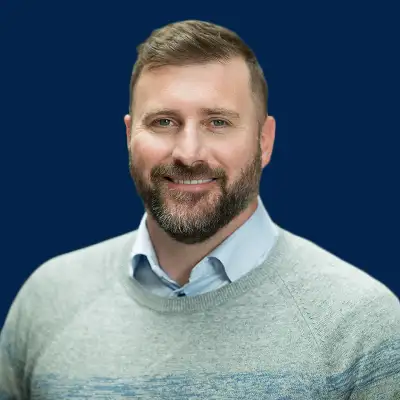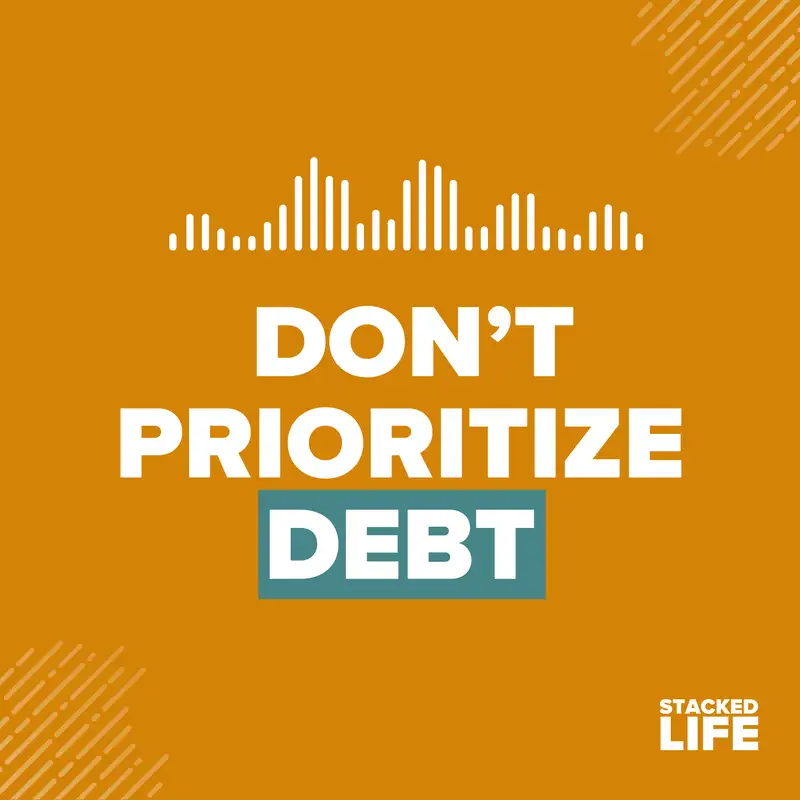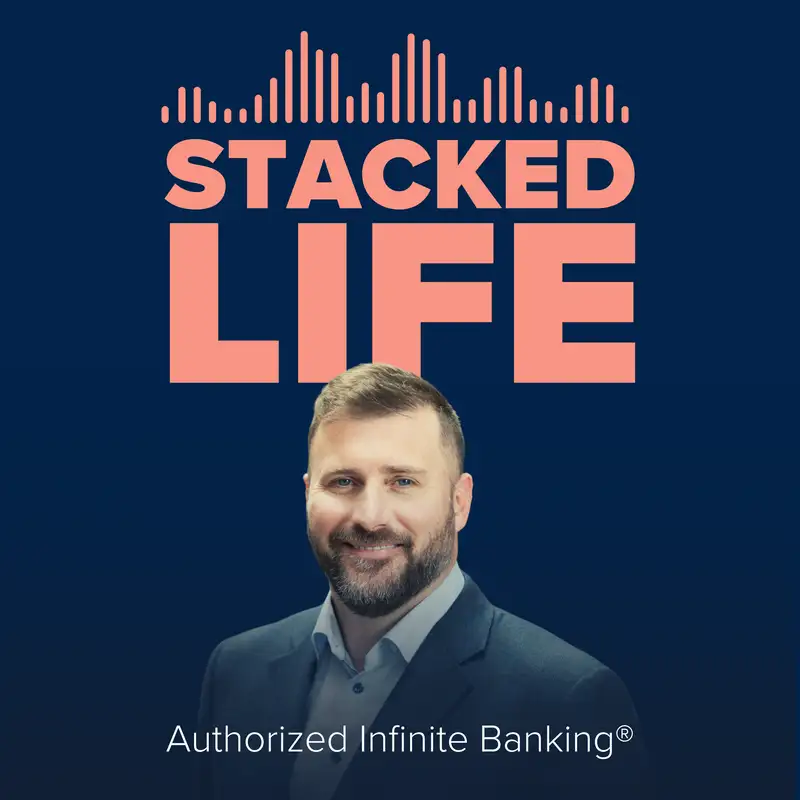21: Build This First (Then Pay Off Your Debt)
021 Stop Prioritizing Debt
===
Speaker: [00:00:00] Is debt in your financial life acting as an enemy or as an ally with the price of everything from groceries to housing, to education, to cars going up and up and up. More and more people are returning to higher levels of debt just to keep up. But what if the conventional wisdom about using handling and then getting out of debt is actually what's causing the problem?
Most people who do get out of debt do it in a way that prioritizes other people's financial systems at the expense of their own. This creates a structural flaw that often causes them to go back into debt if something doesn't go the way they planned. In this episode, we'll talk about a framework for dealing with debt that's fundamentally different from the things you probably hear about, and we're not just talking about paying it off.
We're talking about a strategy to eliminate debt while simultaneously building your wealth and income so that you never have to fall back into debt. This is Stacked Life, the podcast that teaches you everything you need to [00:01:00] know about The Infinite Banking Concept, whole life insurance, and the strategies that make it all work.
And I'm John Perrings, an authorized Infinite Banking practitioner. I've implemented IBC for hundreds of clients and educated thousands more via my top rated podcasts and financial resources at StackedLife.com. Early in my career, I was doing what everyone told me to do. I was maxing out my. 401k sending money away to places I couldn't control and access without paying huge taxes and penalties.
And then when the.com bubble burst and later when the great recession hit, in both cases, I had to liquidate those accounts to get by paying the taxes anyway, plus that nice little 10% penalty on top. All that money I had saved and all its potential future growth was gone forever. And that experience taught me
a pretty rough lesson about the importance of control, especially when dealing with financial pressures like debt.
Negative Impact on Longer Loan Terms
---
Speaker: [00:02:00] Today we're in a challenging environment. Debt levels are rising, you know, reaching all time highs, defaults are rising, and to make things more palatable to the average consumer Financial institutions have stretched out the loan terms. You know, if you look at a car loan, it used to be like a three or four year car loan was, you know, pretty typical.
Now we're seeing seven, eight, even 10 year auto loans out there, and these longer loan terms are available so that people keep buying cars in the face of rising prices, for example.
And they do help, but maybe not as much as you think. For example, the monthly payment on a 10 year loan term is not 50% lower than that of a five year loan term. It's actually only 40% lower, which is a 20% worsening of the terms of a loan. And these are significant hits to our cash flow that
accumulate to create a huge impact on our overall financial [00:03:00] lives. And so the question is what do we do about it? And, you know, we could get into fractional reserve banking and fed policy and all that stuff, but I'd like to just focus on the things that are actually in our control and how can we counteract this debt problem and even start using debt in a way that's advantageous to us? And it all starts with an order of operations, if you will. The foundation of everything is our income and our cash flow. And the main reason people, when they actually do get out of debt, only end up falling right back into debt is that they haven't really solved their cash flow problem.
If our lifestyle expenses grow at the same rate as our income, no debt payoff plan will will ever really stick.
The Economics of Debt
---
Speaker: And this brings us to a core economic principle, which is called "Time Preference." Time preference describes your preference for using money today versus using that money [00:04:00] tomorrow.
For example, a high time preference. Means that you want to spend today, you prefer to use and enjoy that money now to spend on a car or vacation or going out to dinner or whatever. And this is the dominant mindset in our consumer culture, and it's really kind of the one of the main things that is directly leading us into debt.
A low time preference, on the other hand, means you have a low preference to spend money now, which means you're okay with getting the use and enjoyment of that money sometime in the future.
When you have a low time preference, you can deploy your money and let it grow. You have a low interest in using that money right now, which also allows it to earn interest. And so, shifting our thinking from a high to a low time preference is a, I think a critical major step toward financial control and dealing with debt.
The Biggest Challenge with Conventional Debt Advice
---
Speaker: The biggest challenge with [00:05:00] conventional debt advice is that it tells us to focus all of our extra cash flow on sending money away to financial institutions, which are other people's financial systems. So we work hard to pay off all that debt to pay off our credit card, and then when we're done, we might be outta debt.
We don't have any money, right? And so we're kind of starting at square one, essentially back to "even" where unfortunately, because we're starting at square one, we're actually still vulnerable to the very next unexpected expense.
Command Debt with Infinite Banking
---
Speaker: And so all of this kind of leads, of course, to The Infinite Banking Concept, which is probably how you found this podcast. What if instead of sending your money away, you first directed it to a financial product that you control. A product that allows you to get out of debt while building a pool of capital at the very same time. And The Infinite Banking Concept is a process where we strategically accumulate capital, which is a fancy way of [00:06:00] saying "save money."
And the product we use to do that is whole life insurance. And here's how it works for handling debt. First, you buy a whole life insurance policy and you direct cash flows to pay the premium on your policy. Every time you make a premium payment, you build equity in the guaranteed death benefit, which is called cash value.
This cash value is liquid and you can access it at any time using a policy loan.
Infinite Banking to Pay Off Credit Cards
---
Speaker: Here's an example. Let's say you build up some cash value. You then take a policy loan from the insurance company using your cash value as collateral. So let's just make up a number and say you take a $10,000 loan to pay off a $10,000 high interest credit card. You're essentially swapping 22% credit card debt.
Let's just call it 22%. We're swapping that 22% credit card interest for say, 5% policy loan interest. That [00:07:00] alone is a 40% improvement on the monthly cash flow for that particular expense.
It could even be better than 40% because you could pay interest-only on a policy loan or even nothing at all for as long as you want, because the payback terms on a policy loan are entirely up to you.
Get Compound Growth While Getting Out of Debt
---
Speaker: But here's the, probably the more important part of using The Infinite Banking Concept to get out of debt is that your full cash value continues to grow and compound as if you never touched it, because in fact, you didn't touch it.
You borrowed the insurance company's money and your cash value only collateralize the loan. You're now paying down what I would call bad debt, which is that high. Interest credit card debt while your cash value continues to compound uninterrupted. So by the time you've paid off the debt, including the policy loan, you're no longer starting from zero.
You have a significant cash equivalent asset in the form of [00:08:00] your policies, cash value that you've built up all along the way.
Conventional Financial Advice Keeps You Trapped
---
Speaker: I mean, think about the trade off when following the conventional financial advice. You know, we've been taught to send money to a 401k where you can't touch it for decades. All for only the hope of getting whatever they tell us nowadays, 10 to 12% average returns while at the same time spending money paying 22% on credit card debt.
In this scenario, "the math just doesn't math," as they say, you cannot get ahead earning 12% while simultaneously spending 22% on debt.
So if we could look at shifting that cash flow, that 401k cash flow, even temporarily, to build a capital base that you control to then eliminate high interest debt. That is a really powerful, strategic move. Using this high interest credit card example is pretty easy for most people to see.
Don't Make Extra Payments on Low-Interest Mortgage Debt
---
Speaker: But what about low [00:09:00] interest debt like a mortgage? A lot of people are eager to pay off their mortgage early, which is understandable. It's a pretty heavy weight hanging around your neck.
And this has become very popular in what I call the "financial hack" circles on social media. And I have a much different professional opinion about this. If you think about it. Paying extra toward your mortgage to save on interest costs is not what I would call a strategy.
Because if we're only using grade school math, that does show us that there is interest that we save when we pay our mortgage down early.
The actual financial math, which accounts for the Time Value of Money tells a very different story. When you look at the bigger picture.
The thing we have to remember is that every financial decision we make is a trade off. For example, if we looked at a 3% fixed rate mortgage that you could get a couple, few years ago, every extra dollar you send to the bank over and above the [00:10:00] mortgage payment on that 3% mortgage is doing a 3% job for you.
So what you're essentially saying is there's nothing better that you could do with that extra dollar than to save 3% of mortgage interest. And in the same way that it doesn't make sense to invest 12% while you're still paying 22% credit card debt. It also does not make sense to save 3% interest when you could be investing at 12%,
for an example, just to use those same numbers. I mean, you, you could put your money in a high yield savings account right now and probably do better than 3%. So what happens is people focus on the interest that they save, but they completely ignore the opportunity cost, which is what they could have earned on that money if they had deployed it elsewhere,
doing something better than a 3% job.
From a pure numbers perspective, you'll come out further ahead by investing your extra cash flow in [00:11:00] something that has a rate higher than your mortgage interest, rather than just paying your mortgage down early. Now, here's the thing, there's another variable to consider here because our financial lives are not always just about the strict math, right? I've talked to a lot of people who will, who they feel significantly more at peace knowing that they're on a trajectory to pay that mortgage off.
And if that's the case, then. That's fine. Like, you know, the math says one thing, but if you just are sleeping better at night, knowing that you're on a track to pay that mortgage off early, then you know that's okay. As long as you understand the trade-offs, then you're making an informed decision about what will make you happier, which is what we're all trying to get to, right?
There's nothing at all wrong with that. But if the goal is to get ahead financially. I say prioritizing someone else's financial system over your own is simply a less optimal decision.
After Debt is Paid, Now We Have a Bunch of Cash
---
Speaker: [00:12:00] So the last piece I'll mention here is the fact that once we strategically pay off debt, we're now in a position of cash.
And what can we now do with this cash? When we're using whole life insurance and implementing The Infinite Banking Concept, after we're, after we've paid off that debt, we've got all this cash value, that's liquid capital, what can we do with it? Hopefully we can start making some low time preference decisions and start buying assets that generate income. There is really nothing that combats rising prices and the need to use outside debt than increasing our income.
4 Keys to Getting Ahead
---
Speaker: Ultimately getting ahead really only comes down to a few key things, increasing your control, boosting your income, managing your cash flow, and strategically capitalizing. By focusing on these principles, you can turn the problem of debt into an opportunity where we use debt that we control to build [00:13:00] real sustainable wealth.
If you find these principles are resonating with you and you'd like to learn more about how they might apply in your life, head over to StackedLife.com and schedule a free consultation with me. I'll take you through a short assessment and we can see if and how The Infinite Banking Concept might benefit you specifically in your life.
And if so, I'll show you the next best step that you can take. Thanks. See you on the next one.
Creators and Guests


